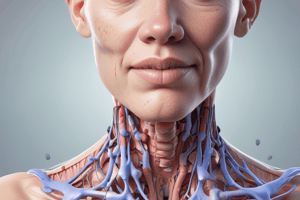Podcast
Questions and Answers
What is the medical condition characterized by enzyme replacement therapy?
What is the medical condition characterized by enzyme replacement therapy?
Hypophosphatasia
What is the name of the thyroid disorder chapter in the book 'Diagnosis of Bone and Joint Disorders'?
What is the name of the thyroid disorder chapter in the book 'Diagnosis of Bone and Joint Disorders'?
Thyroid disorders
What is the effect of primary hyperparathyroidism on bone?
What is the effect of primary hyperparathyroidism on bone?
Impact on bone
What is the name of the medical condition characterized by skeletal manifestations in chronic renal insufficiency?
What is the name of the medical condition characterized by skeletal manifestations in chronic renal insufficiency?
What is the name of the condition characterized by subchondral resorption of bone in renal osteodystrophy?
What is the name of the condition characterized by subchondral resorption of bone in renal osteodystrophy?
What is the name of the medical condition characterized by magnification radiography of target sites of absorption?
What is the name of the medical condition characterized by magnification radiography of target sites of absorption?
What is the name of the condition characterized by radiographic appearances of the knee epiphyses and biochemical data?
What is the name of the condition characterized by radiographic appearances of the knee epiphyses and biochemical data?
What is the name of the chapter in the book 'Diagnosis of Bone and Joint Disorders' that discusses scurvy?
What is the name of the chapter in the book 'Diagnosis of Bone and Joint Disorders' that discusses scurvy?
What is the name of the condition characterized by skeletal manifestations in a case report from Dubai?
What is the name of the condition characterized by skeletal manifestations in a case report from Dubai?
What is the name of the medical condition characterized by multiple brown tumors in a patient with chronic renal failure and secondary hyperparathyroidism?
What is the name of the medical condition characterized by multiple brown tumors in a patient with chronic renal failure and secondary hyperparathyroidism?
Flashcards are hidden until you start studying
Study Notes
Skeletal Findings in Metabolic Bone Diseases
- Skeletal findings in hyperparathyroidism are most readily recognized in the hand (31%)
- Subperiosteal bone resorption in hyperparathyroidism begins at the radial aspects of the middle phalanges
- Bone resorption can also occur in the ribs, lamina dura, humerus, femur, and upper medial tibia
- Trabecular, intracortical, endosteal, subchondral, and subligamentous or subtendinous bone resorption can also occur
Tumor-Induced Osteomalacia
- Generalized osteopenia, vertebral body fractures, and multiple Looser zones are characteristic of tumor-induced osteomalacia
- Fibroblast growth factor 23-secreting mesenchymal tumors can cause tumor-induced osteomalacia
Hypophosphatasia
- Hypophosphatasia is characterized by severe calvarial ossification defects
- Soft-tissue deposits of calcium hydroxyapatite, calcium pyrophosphate dihydrate, and calcium oxalate can occur around large joints
Amyloid Deposition
- Amyloid deposition can occur in patients undergoing long-term hemodialysis
- Amyloid deposition can lead to carpal tunnel syndrome in as many as 31% of patients
Primary Hyperparathyroidism
- Primary hyperparathyroidism can cause bone resorption, leading to osteopenia and Looser zones
- Jaw pain and bone deformities are common symptoms of primary hyperparathyroidism
Acromegaly
- Acromegaly can cause thick frontal bones and an enlarged sella
- Spade-shaped distal phalangeal tufts, an enlarged heel pad, and thick plantar skin are characteristic of acromegaly
Scurvy
- Scurvy is characterized by osteopenia, periosteal elevation, and metaphyseal beaking
- Frankel lines and Trummerfeld zones or scurvy lines reflect accumulation of hemorrhage in the zone of provisional calcification
- Subepiphyseal "corner" fractures can occur in scurvy
Studying That Suits You
Use AI to generate personalized quizzes and flashcards to suit your learning preferences.




